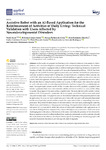Assistive robot with an AI-based application for the reinforcement of activities of daily living: technical validation with users affected by neurodevelopmental disorders

View/
Use this link to cite
http://hdl.handle.net/2183/31867
Except where otherwise noted, this item's license is described as Creative Commons Attribution 4.0 International License (CC-BY 4.0)
Collections
- Investigación (FCS) [1293]
Metadata
Show full item recordTitle
Assistive robot with an AI-based application for the reinforcement of activities of daily living: technical validation with users affected by neurodevelopmental disordersAuthor(s)
Date
2022-08-23Citation
Nasri N, López-Sastre RJ, Pacheco-da-Costa S, Fernández-Munilla I, Gutiérrez-Álvarez C, Pousada-García T, et al. Assistive robot with an AI-based application for the reinforcement of activities of daily living: technical validation with users affected by neurodevelopmental disorders. Appl Scie. 2022;12(19):9566
Abstract
[Abstract] In this work, we propose the first study of a technical validation of an assistive robotic platform, which has been designed to assist people with neurodevelopmental disorders. The platform is called LOLA2 and it is equipped with an artificial intelligence-based application to reinforce the learning of daily life activities in people with neurodevelopmental problems. LOLA2 has been integrated with an ROS-based navigation system and a user interface for healthcare professionals and their patients to interact with it. Technically, we have been able to embed all these modules into an NVIDIA Jetson Xavier board, as well as an artificial intelligence agent for online action detection (OAD). This OAD approach provides a detailed report on the degree of performance of a set of daily life activities that are being learned or reinforced by users. All the human–robot interaction process to work with users with neurodevelopmental disorders has been designed by a multidisciplinary team. Among its main features are the ability to control the robot with a joystick, a graphical user interface application that shows video tutorials with the activities to reinforce or learn, and the ability to monitor the progress of the users as they complete tasks. The main objective of the assistive robotic platform LOLA2 is to provide a system that allows therapists to track how well the users understand and perform daily tasks. This paper focuses on the technical validation of the proposed platform and its application. To do so, we have carried out a set of tests with four users with neurodevelopmental problems and special physical conditions under the supervision of the corresponding therapeutic personnel. We present detailed results of all interventions with end users, analyzing the usability, effectiveness, and limitations of the proposed technology. During its initial technical validation with real users, LOLA2 was able to detect the actions of users with disabilities with high precision. It was able to distinguish four assigned daily actions with high accuracy, but some actions were more challenging due to the physical limitations of the users. Generally, the presence of the robot in the therapy sessions received excellent feedback from medical professionals as well as patients. Overall, this study demonstrates that our developed robot is capable of assisting and monitoring people with neurodevelopmental disorders in performing their daily living tasks.
Keywords
Assistive robot
Human-robot interaction
Neurodevelopmental disorders
Human-robot interaction
Neurodevelopmental disorders
Editor version
Rights
Creative Commons Attribution 4.0 International License (CC-BY 4.0)
ISSN
2076-3417






